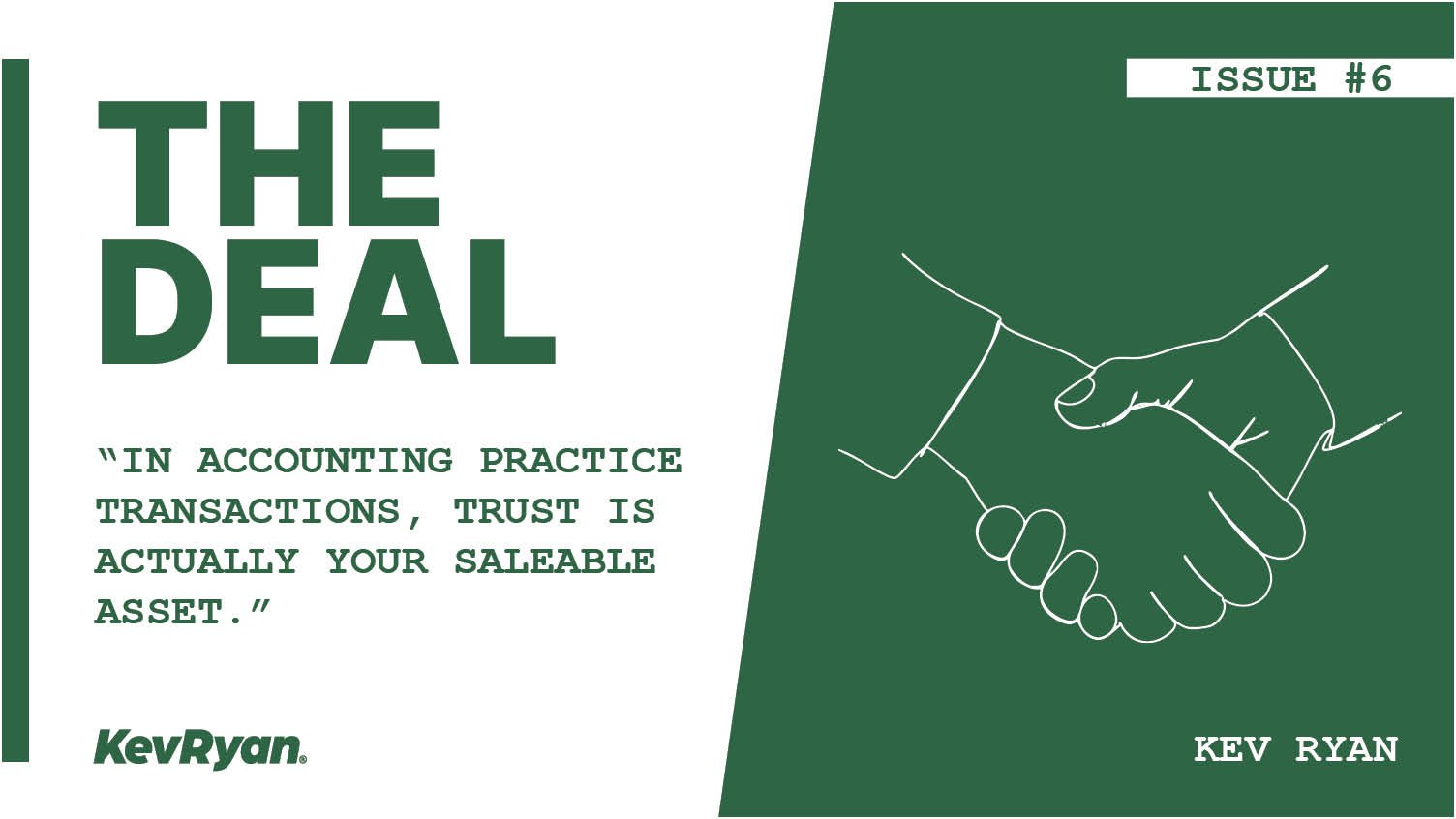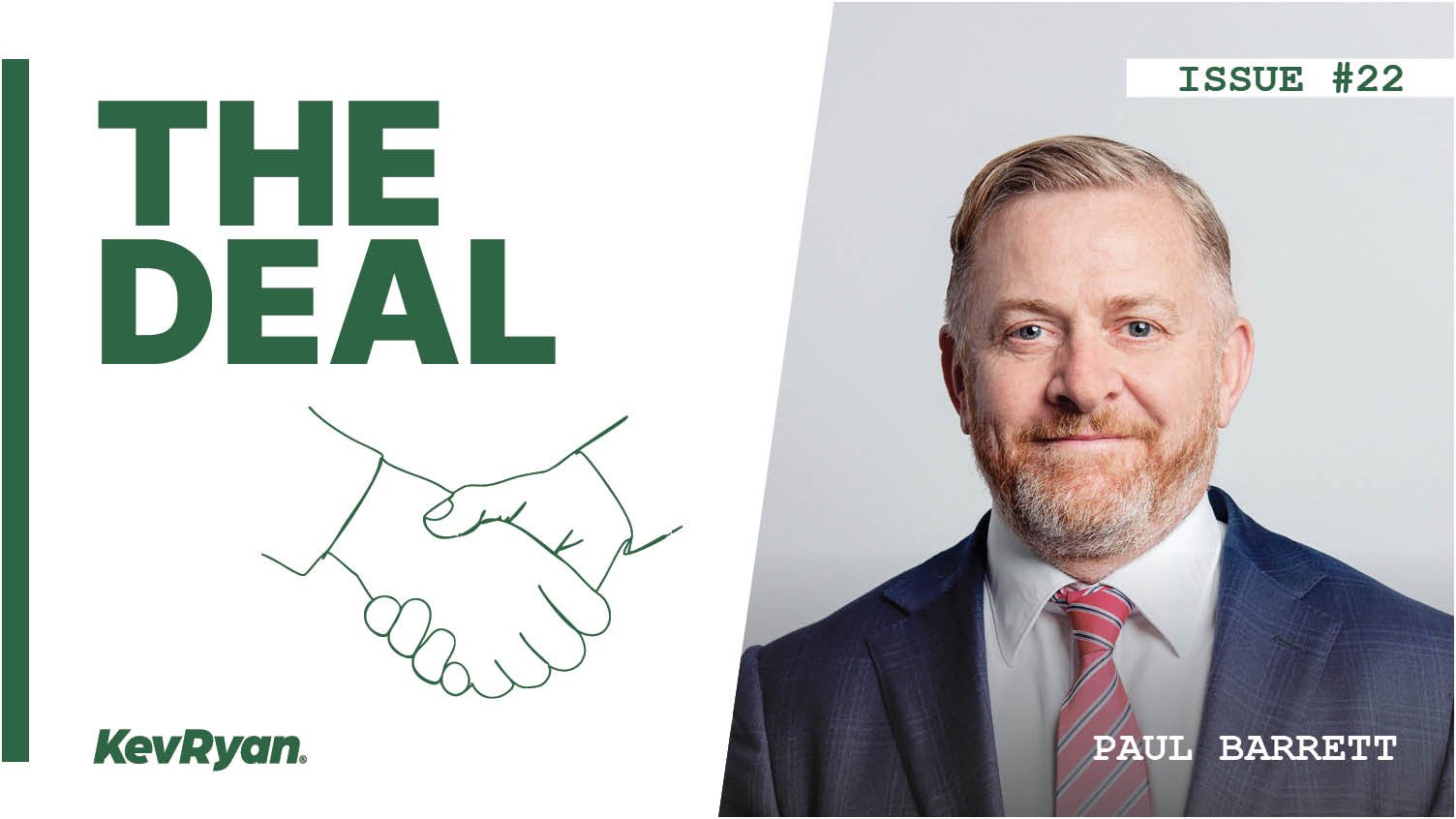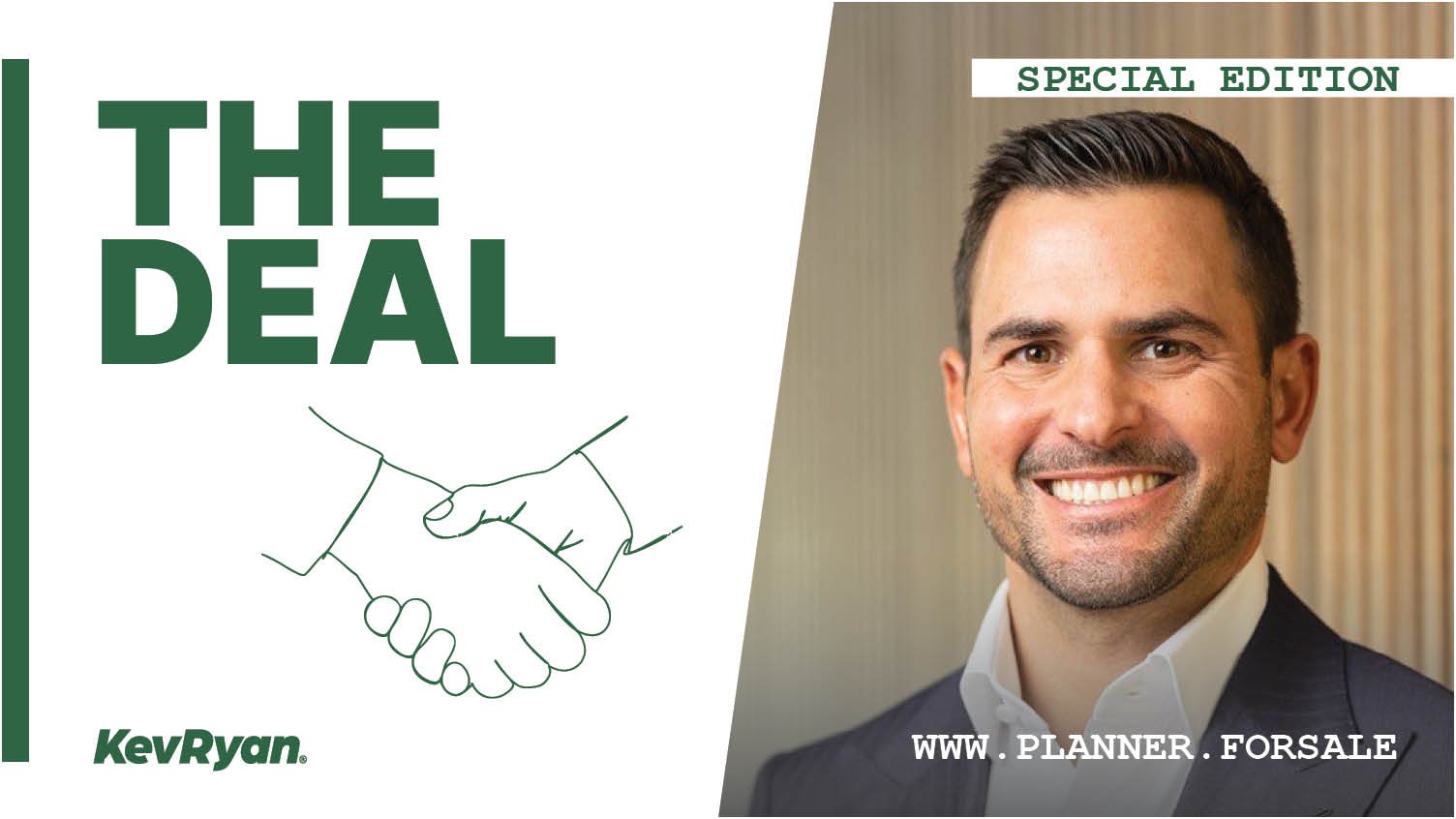Transfer trust to ensure retention.

When selling your accounting business, you really have only one job to do... get your clients to simply keep doing what they've always done, trust you!
It will be of no surprise to you that on a daily basis I get asked this question, “what do you think my accounting firm is worth?”
My answer however could be a surprise to you, and it is always, “how well do you think you can transfer trust?"
Having worked with accountants buying, selling & merging for well over a decade now you may think I’d have a fancy spiel, a silver bullet valuation suggestion or a firm answer for these enquirers and their question. I don’t.
Truth is that until we do the work, nobody will know what your accounting business is worth and importantly, to whom. Which is why we have a transaction readiness process that helps establish the likely market perception on valuation and price of your firm.
But the one thing I know for sure right off the bat is that if you don’t successfully transfer trust (and I’ll explain what I mean) the upfront valuation or agreed sale price will not be fully obtained as you’ll blow up your retention clause.
So, what am I talking about?
Well, what I have come to believe over my journey is the actual asset being sold, the goodwill of an accounting business is trust and by this I mean the trust your team and clients have in you (the Partner(s)).
Principles (Partners / owners) of accounting firms overestimate their assumed "trusted advisor" status as being personally tied to themselves. It's not. It's tied to your clients' naivety around what you actually do - I’m talking at the core. Clients don’t really know what tax compliance actually means, entails and its statutory requirement - the one thing that makes the industry so lucrative and recession proof (and as we've now seen, pandemic proof).
The client doesn't think you're the guru their repeat custom (loyalty) has led you to falsely believe.
The client does however, and deeply, trusts what you do for them, the peace of mind you sell them being that they’ll be all square with the ATO. They believe, trust in, what you do for them in and around paying the right taxes at the right time. They don't know or care how you do this, they just trust that it's being done and correctly. You are the one that is delivering a service (a process) to offer this trust to them, and it's the result of this service that they are looking for. They don't care how or who got them there, they just want to arrive at a tax compliant destination.
So when it comes time to sell your accounting business it's my belief that what really matters is your ability to transfer this trust, this peace of mind outcome, the compliant destination. And this is achieved by effectively communicating to your client base that they should continue to trust you and believe you when you say that you’ve found a transaction party that you trust and all the client needs to do is to continue to trust you as they have during their life as a client of yours.
Put simply, your message to clients during your transition is, “you’ve trusted me for all these years, trust me now and know that I’ve made the right decision, have taken the time to do so and believe I’ve got the right transaction party that will continue to deliver services as I have.”
Of course, if your business is a crap business then we have other things to do in the 'ready for sale' process, but assuming you're in good shape and indeed have a saleable business the only goal that matters is "retention".
You’re selling the transfer of trust and retention is your measure of how well you've done so.
And although the transition process is not always easy, there is one simple requirement - convince your clients they can trust the new owner, as they trusted you, to get the job done... to deliver that peace of mind, to arrive at that destination where they are comfortable that their work will get done and it will be correct, that they are square with the ATO.
That's it. Simple.
This I believe is the task when selling and where your business value sits and ultimately what your firm will be worth in the end.
MORE ISSUES
In practice since July, 1976, Graham Gunn had one simple wish as he put his business onto the market – that his clients were well cared for. After all, they’d been a part of his life for quite a while...
When Andrea Pearce contacted Kev Ryan desperate to sell her business, a remarkable journey of reinvention began.
Employee entitlements and consultation are often overlooked during a deal, giving rise to numerous issues. Fortunately, says employment relations specialist Rachael Smith, getting it right is easier than you think.
Once an accounting firm has client engagement sorted, and preferably automated, the business becomes more profitable and easier to sell.
If you own your practice, proactive estate planning can enhance your legacy, support your loved ones and protect your staff.
The sale of an accounting firm requires careful planning and strategy. Transaction advisor Kev Ryan shares his insight into the essential ingredients for sale success.
For a successful strategic partnership after a merger, flawless due diligence and complete cultural alignment are essential.
Many think the biggest challenge in selling an accounting business will be in haggling over the price. But agreeing value, Kev Ryan says, is the easy part.
When the demands of his accounting business became overwhelming, Maurice Sucevic found a way to continue doing what he loved, without all the admin.
With a significant number of accounting firm owners looking towards a well-deserved retirement over the next decade, the industry will see an increasing number of mid-tier practices in the mergers & acquisition market.
Hartnett & Co’s significant client portfolio appealed to Progression Group, aligning with their areas of expertise and presenting a strategic opportunity to expand their client base and enhance efficiencies.
The journey towards the partnership with Carbon Group started from the realisation that as successful as MG Partners was, Mike and George needed to have a succession plan in place.
There are over 37,400 accounting businesses in Australia, according to IBIS World. The majority are small to medium enterprises (SMEs).
Each February, Australia Day sees the summer break come to an end and with school recommencing, Accountants that have been considering the year ahead start calling my office.
Accounting firms, known for their meticulous number-crunching skills, often find themselves embroiled in complex staffing issues when it comes to mergers and acquisitions.
As the year comes to an end, I thought this December Issue of The Deal could cover a recap of the year’s transactions
Malcolm had been working in his firm for over 20 years and business had plateaued. He wanted to expand but didn’t have the time, capacity, or resources.
A spate of mergers and acquisitions in the accounting industry shows the dynamics around consolidation have changed dramatically since the pandemic.
A spate of mergers and acquisitions in the accounting industry shows the dynamics around consolidation have changed dramatically since the pandemic.
In the dynamic world of business, growth strategies play a defining role in achieving long-term success.
TC & Co Consulting is a Sunshine Coast based accounting firm that Kev Ryan helped progress to the next level through a business sale process with the Gild Group.
Last month, I was fortunate enough to be invited to speak with the CPAs Sunshine Coast discussion group on the topic of Accounting Practice M&A.
Have you ever found yourself wondering “what’s next”?
“This is way harder than it used to be.”
“This isn’t my job is it?” …
It is with great pleasure I introduce www.Planner.forsale and our launch marquee Buy Side client Nick Reilly of Inovayt Wealth.
Kevin Scambler wanted a partner he could trust that would ultimately buy him out. Andrew Burness was looking to become more invested, building something that would advance his career.
A lawyer’s role is to protect the legal interests of their client. Schooled in spotting problems, and often risk averse themselves, lawyers naturally seek to minimise risks to their clients.
There are a lot of accounting industry participants who at some stage in their careers have either experienced or know a someone who has experienced, the good old dangling of the “Partnership” carrot.
Gary wanted to provide consistent outstanding service in his accounting business. This meant making strategic decisions about other interests consuming his time and energy.
When selling your accounting business, you really have only one job to do... get your clients to simply keep doing what they've always done, trust you!





























